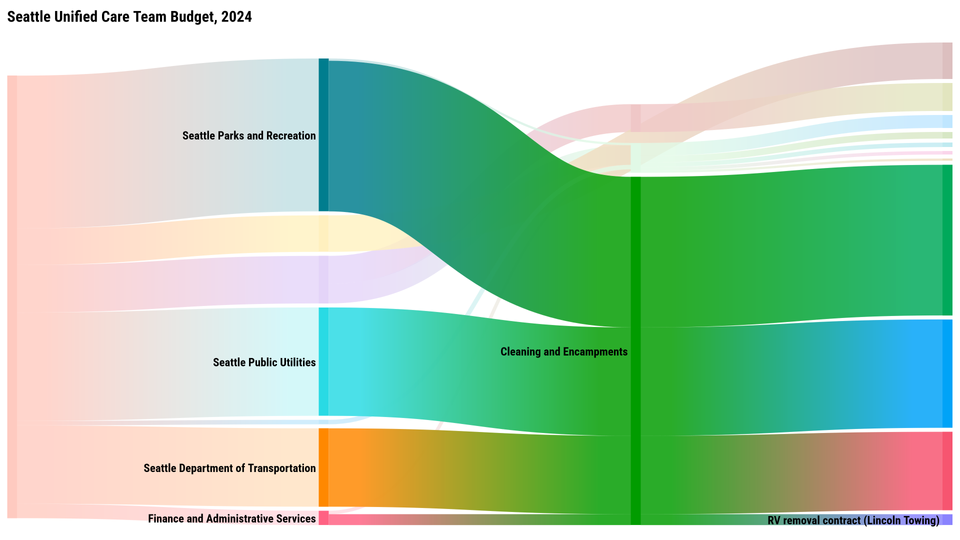Unpacking Seattle’s $26.6 million sweeps budget

Author’s note: Gossip Guy is back! After a very busy June I am excited to get back to regular newsletter posts. But don’t worry, I haven’t been idle; the tea has been steeping ;).
Last month, I reported in Real Change on the record level of displacement Seattle subjected its homeless residents in 2023. Logs obtained from the city’s Unified Care Team (UCT) indicated that at least 2,800 forcible removals — commonly known as sweeps — took place that year. This comes as King County’s most recent Point-In-Time survey shows the number of unsheltered homeless people sleeping on the streets or informal accommodations every night reached nearly 10,000.
The UCT is a cross-city formation spanning seven different departments with leadership from Seattle Mayor Bruce Harrell’s office tasked with carrying out sweeps of unhoused people. It was formed in early 2022, shortly after Harrell took office as a spiritual successor to the Navigation Team, to fulfill his promise of clearing parks and public spaces of unhoused people’s encampments. The Navigation Team was defunded by the Seattle City Council in August 2020 in the wake of that summer’s Black Lives Matter uprising against police brutality and after years of advocacy from homelessness activists.
In my Real Change article, I mentioned that Seattle has allocated about $26.6 million to sweeps in the 2024 city budget. This is about a $550,000 increase from 2023, when $25.9 million that was allocated in 2023. This information comes from a spreadsheet I received in a public disclosure request this spring, which can be found here.
You can see the allocation of funds in the UCT Budget visualized in the Sankey chart above. From my reading, the budget can be split into four rough categories:
Firstly, the bulk of the money, roughly $20.9 million, goes to encampment and vehicle sweeps as well as other things labeled by the city as “cleaning and encampments.” A lot of the funds are awarded to nine different contracting companies, which do the day-to-day work of removing people’s trash and belongings at encampments.
This money is further broken down between different departments. According to Harrell spokesperson Callie Craighead, Seattle Parks and Recreation is primarily responsible for sweeps in Seattle’s North End, while the Seattle Department of Transportation (SDOT) takes care of sweeps in the South End. Seattle Public Utilities’ work, Craighead said, “is related to specific needs such as RV remediations, geo cleans, and illegal dumping.”
In total, the equivalent of 51.5 full time employees are assigned to the UCT by the Parks Department, with 18 others contracted by SDOT. The city’s Finance and Administrative Services department also maintains a $654,000 contract with Lincoln Towing to remove and impound RVs and other unhoused people’s vehicles.
The second largest category of funding goes toward maintaining “safety and compliance” during sweeps. This consists of $2.2 million for the salaries of Seattle Police Department and Parking Enforcement officers assigned to sweeps.
The third category of money within the budget is the nearly $1.8 million that goes to various administrative functions that keep the UCT running. This includes manager salaries, customer service representatives, a training coordinator, data reporting with the King County Regional Homelessness Authority and geographic information systems.
The fourth and smallest category of funds is $1,679,000 that pays for seven homelessness outreach workers and their transportation costs. These outreach workers connect people who get swept to shelter and other resources.
However, activists and other peoples familiar with Seattle’s sweeps policies say that the outreach workers aren’t always present and generally do not have enough openings at shelters to accommodate everyone in need. The vast majority of sweeps — about 99% — are also categorized as obstructions, exempting the UCT from requiring prior outreach in accordance with the city’s own administrative rules.
The $26.6 million allocated to Seattle’s Unified Care Team, whose primary goal is to displace homeless people, is substantial. In fact, it is more than the $25.3 million allocated to the Equitable Development Initiative this year; the Seattle City Council recently sparked a political controversy over those funds by considering to freeze them. The UCT’s budget is also more than the annual revenue from the city’s library levy ($25.2 million) and equivalent to 29.5% of the total Seattle Public Library budget. It is also noteworthy that public health research suggests sweeps and other forms of continual displacement endanger unhoused people and their well-being.
For now, this brief exploration of Seattle’s sweeps budget is where I’m concluding this post. However, in a follow-up story I will further explore the UCT’s messy recordkeeping system and why the 2023 sweeps numbers are so confusing. I am also hoping to share a publicly accessible repository of Seattle sweeps records soon, so be sure to subscribe so you can stay up to date!

Member discussion